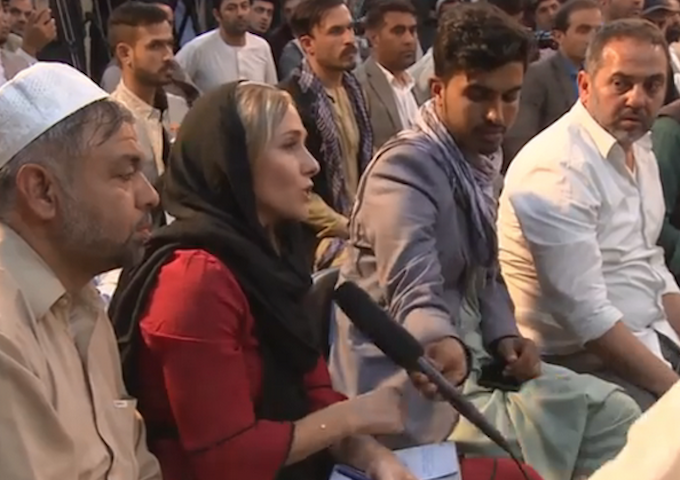OPEN LETTER: A reply to New Zealand journalist Charlotte Bellis from Afghanistani mother and former broadcaster Muzhgan Samarqandi
My name is Muzhgan Samarqandi and I am from Baghlan, Afghanistan, but living in New Zealand with my Kiwi husband and our son. Like Charlotte Bellis, I too was a broadcaster in Afghanistan, back when this was possible for a woman without being a foreigner.
As a mother, my heart goes out to Charlotte, and I sincerely hope she and her partner get to New Zealand so she can give birth at home surrounded by her family.
As someone who has travelled for study and work and love, and who does not share the same passport as their significant other, my heart goes out to everyone stranded overseas, and I sincerely hope they can all get home and be reunited with their loved ones.
But as an Afghanistani woman, who has only recently emigrated from Afghanistan to New Zealand, I have to speak up.
I almost did so when Charlotte interviewed Abdul Qahar Balkhi, the Taliban spokesperson with the Kiwi accent. She went easy on him. For example, at the end of the interview, she asked what he had to say to those who called the Taliban “terrorists”.
He said people didn’t really believe they were terrorists, but this was just a word the US used for anyone who didn’t fall in line with their agenda. There were no further questions.
This was a man who claimed responsibility on behalf of the Taliban for attacks on innocent civilians. A man who has admitted to crimes against humanity. It made me so upset to see him get away with answers like that. But then my energy was taken up just coping with the reality of what was happening to my friends and family in Afghanistan.
Social media responses
But now, when I read Charlotte’s letter in the New Zealand Herald and see the media and social media responses, I see the situation in my country being trivialised, and it makes me angry.
Charlotte refers to herself asking the Taliban in a press conference what they would do for women and girls, and says she is now asking the same question of the New Zealand government.
I understand there are problems with MIQ. And I understand the value in provoking change with controversy. But what I don’t understand is how someone who has lived and worked in Afghanistan, and seen the impact of the Taliban’s regime on women and girls, can seriously compare that situation to New Zealand.
Afghanistani women who resist or protest the regime are being arrested, tortured, raped and killed. Young girls are being married off to Talibs (a member of the Taliban). Education and employment are no longer available to them.
A 19-year-old girl I know from my village, who was in her first year of law last year is now, instead, a housewife to a Talib.
There are so many stories like this.

The Taliban distort Islam
Charlotte says the Taliban have given her a safe haven when she is not welcome in her own country. This is obviously a good headline and good way to make a point. But it is an inaccurate and unhelpful representation of the situation.
One commentary on Instagram, re-posted by Charlotte, suggested her story represents the truly Muslim acts of the Taliban, which the Western media have not shown. This makes me angry.
If a person in power extends privileges to someone who doesn’t threaten their power, it doesn’t mean they are not oppressive or extremist or dangerous.
The Taliban distort Islam and manipulate Muslims for their political gain. They violate the rights of women and girls, and it is offensive to compare them to the New Zealand government in this regard.
New Zealand is no paradise, I have experienced my fair share of racism here, and I am sure the MIQ situation can be improved.
But relying on the protection of a regime that is violently oppressive, and then using that to try to shame the New Zealand government into action, is not the way to achieve that improvement.
It exploits and trivialises the situation in Afghanistan, at a time when the rights of Afghanistani women and girls desperately need to be taken seriously.
Muzhgan Samarqandi works for an international aid agency in New Zealand. Her article was first published on the TV One News website and is republished here with the author’s permission.
Article by AsiaPacificReport.nz






